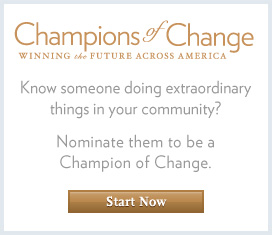Champions of Change Blog
Involve Me and I Will Understand
Posted by on April 17, 2013 at 12:47 PM EDT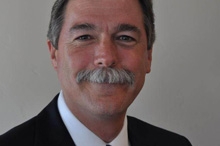 Douglas McNeil is being honored as a Champion of Change for his efforts in being a Rotarian.
Douglas McNeil is being honored as a Champion of Change for his efforts in being a Rotarian.
My dream to become part of the space program was set in stone the day I watched Neil Armstrong set foot on the moon. I was only nine at the time, but I can still feel the excitement of that moment. During my teens, I was selected to participate in NASA’s youth training program. We were trained by a couple of remarkable engineers who set such good examples that they paved the way for my career as an engineer, and later helped me with mentoring and developing programs for youth. To this day, I emulate the style of those engineers in hopes to inspire teens to pursue careers in science.
My engineering career began at NASA/Ames Research Center as an intern, then on to Lockheed Martin Missiles and Space, where I joined a team of engineers. At Lockheed I participated in the designing, developing, and launching of over 118 satellites with several launch service providers from three continents. I have held executive positions in several Silicon Valley cutting-edge companies, developing and launching new products for the Aerospace, Wireless Telecommunications, Laser Communications, Biometrics, and High-Throughput Materials Research industries. My work has taken me around the world. I have worked with and developed international business partners in Moscow, China, Australia, Taiwan, Germany, and France. Presently I am a Senior Director at Kinestral Technologies, Inc., in San Francisco.
As a parent of two children, the opportunity to coach and mentor young people for the past twenty years has been part of our family activity. With two active and very curious children, the scope of the programs ranged from sports, the environment, technology, space, and science. When I joined Los Gatos Morning Rotary Club, I embraced the chance to create a program that would engage local youth in Science, Technology, Engineering, and Math (STEM) in a way that would allow them to change the world for youth living in other countries.
A philosophy I often refer to when working with youth sets the tone for Lighting for Literacy:
Tell me and I will forget, show me and I might remember, involve me and I will understand. – Confucius
What began collaboratively with the Los Gatos Morning Rotary and Los Gatos United Methodist Church has now expanded to benefit multiple organizations. One Rotarian commented, “This is one of the best and most relevant next generation projects I have seen serving humanitarian efforts in the United States and the world….we would like to join your cause.”
In 1985, Rotary declared basic literacy to be a pre-condition to the development of world peace. Rotary International has an exponential opportunity to empower and mentor the next generation of youth by helping youth understand that they can change the world with humanitarian service projects that profoundly change the lives of the underprivileged throughout the world.
Twenty percent, or 1.5 billion people, are living in total darkness with no electricity. Within this population, eighty-five percent are illiterate. Most earn an average of $2.50 a day, with thirty percent of their wages spent on kerosene and candles – both highly toxic, flammable products – to heat and light their homes. Los Gatos Morning Rotary in partnership with the United Methodist Church in Los Gatos, California, partnered to develop an Earth Day project for youth to promote literacy with an innovative, renewable, and sustainable solar lighting system. The Lighting for Literacy project teaches science, sustainability, and the Rotary motto of “Service Above Self,” while brightening educational pathways for those living off the grid. With this program, we have changed the lives of youth, and have profoundly influenced the next generation with a clear vision of serving the greater good. Through the power of STEM, youth gain first-hand experience in learning how something that they build with their own hands has the power of global stewardship and the opportunity to raise the human potential for the twenty percent who live in darkness after the sun sets.
In 2012, President Barack Obama announced the White House Initiative called “Educate to Innovate,” which promotes STEM programs and calls for a nationwide educational expansion of science-related projects to build the jobs of the future. With California ranked next to last in science proficiency, it seemed appropriate for Rotary’s District 5170 club in the Silicon Valley to take a lead role in catalyzing change. In 2012, we took a fundamentally simple concept and developed a transformational science program that is changing the lives of over a hundred youth, all in the blink of an eye. This April, another installation is taking place in Mexico.
Middle and high school children work together with adult mentors to learn how to build a basic circuit board. With this board and a one-foot solar panel, a 12-volt battery, an 18-inch LED strip, and the flip of a switch, we are transforming the lives of underprivileged youth across multiple continents. With as little as 60 watts of solar power we are now generating enough renewable light to provide 700,000 lumen hours to win the futures of youth around the world who are living off the grid, all for the low cost of approximately 25 premium lattes per unit. This low-cost, compact, renewable, sustainable solar lighting system, used as a national STEM science project, is now spreading to villages in Mexico and India, providing four hours of lighting every night. This enabling youth service project provides the educational opportunity to read, write, and lead more productive lives. The Lighting for Literacy project helps today’s youth to help millions of underserved youth to learn and to experience the joy of reading.
The hope of the future is education. Mentoring youth with the knowledge to change the lives of others will enable the next generation of Rotarians to bring about profound and inspirational change in ways not thought possible. Through Rotary, we now have a project to educate, empower and enable a new generation of youth previously living in darkness. Together we brighten the futures of those who give and those who receive in building a better world through One Rotary. At a global level, we involve and teach youth so they discover “innovative humanitarian acts of service” to promote Rotary International President Tanaka’s Rotary goal of “Peace through Service.”
Doug McNeil co-developed Lighting for Literacy (LFL) and is the Senior Director at Kinestral Technologies, Inc.
Learn more aboutSanctuary for Immigrants
Posted by on March 29, 2013 at 6:26 PM EDT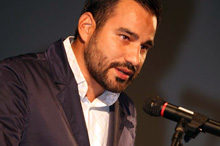 Javier H. Valdés is being honored as a Champion of Change for his efforts as an Immigration Reformer.
Javier H. Valdés is being honored as a Champion of Change for his efforts as an Immigration Reformer.
My family’s experience has long been one of immigration: from my grandfather immigrating to Argentina to my parents immigrating to the U.S., we have repeatedly set out to build a life in a new place. One thing that stands out as a common thread in all my ancestors’ stories is that, wherever they went, they survived and thrived by working with their community to build supportive structures and lay down roots for the next generation.
When I moved to Texas from South America in 1987, I remember learning about Cesar Chavez in school. As an adult I learned more about him on my own, reading about his work, philosophy, and history. I have always been moved and inspired by his deep commitment to the cause of justice and to the people he represented. I am honored to be recognized as a Cesar Chavez White House Champion of Change.
At Make the Road New York (MRNY), where I serve as Co-Executive Director, we work to transform lives and empower immigrant communities. We organize in some of the most economically marginalized communities in the United States, while providing direct services to keep families out of poverty. By helping immigrants to directly engage and advocate on the issues most critical to their lives, we have, together with our allies, shaped New York into one of the most immigrant-friendly states in the nation.
With language access posing a critical problem, beginning in 1999, we organized to win translation and interpretation in multiple levels of government and society so that immigrants can fully participate, stay healthy, and care for their children. We began with ensuring translation and interpretation at New York City public benefits offices, then went on to establish these rights at major public and private hospitals across New York State; in major chain pharmacies statewide; and in all City, State, and Suffolk County government agencies. These protections are fundamental and New York now stands as an example to other states.
We have also helped New York to become a leader in protecting the safety of immigrants and helping to keep immigrant families from being torn apart by deportations. The intentions of the Federal Secure Communities program are to make us all safer; by sharing information between government agencies, Immigration and Customs Enforcement (ICE) seeks to root out dangerous criminals. However, during this quest to make our country safer, the U.S. is actually failing to protect the human rights of many of the most vulnerable people living here. Secure Communities compels local governments to hold thousands of people suspected of being undocumented immigrants at local taxpayer expense and turn them over to ICE, where they are funneled into the black hole of immigration detention, often without access to adequate legal representation.
In practice, in New York City, we found that this made our communities feel less safe. Community members were afraid to approach police officers either to ask for help or report a crime for fear that any engagement with law enforcement could lead to detention. Victims of crimes were often swept up.
We decided that this was not the kind of city we wanted New York to be. We helped families affected by detentions to come forward about their experiences, and we showed lawmakers that our criminal justice system was not living up to the character of New York. Through the work of a citywide coalition of community, advocacy, and legal groups, MRNY and our allies have won new legislation to limit ICE's involvement in NYC corrections facilities and to prevent local law enforcement agencies from spending millions of city taxpayer dollars to hold individuals at ICE's behest. Thousands of unnecessary deportations will be avoided, saving local and federal tax dollars while keeping our communities strong and families stable. These laws demonstrate that the City of New York is willing to stand behind immigrant families and stand up for humane immigration policy that keeps families together locally, while we fight for just and humane reform nationally. We in New York hope that the federal government will exercise even greater discretion in determining who is targeted for deportation. New York has always been a sanctuary for immigrants and we believe it always should be.
However, without comprehensive immigration reform, our work at the City and State levels can only go so far. We need just national reform that values the contributions immigrants make to the character, prosperity, and humanity of the United States. Immigrants have made New York the wonderful city it is, both economically and culturally. And like New York, the United States has always been a place of opportunity, refuge, fairness, and compassion. What better way to honor the legacy of justice left by Cesar Chavez than to extend that opportunity and give immigrant families a meaningful path to citizenship so they can continue to contribute and make our country as strong as it can be.
Javier H. Valdés oversees the organizing and policy work at Make the Road New York in the areas of civic participation, civil rights, education, housing, environmental justice, LGBTQ, and immigration.
Learn more aboutDiversity and Civic Inclusion
Posted by on March 29, 2013 at 5:56 PM EDT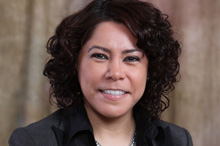 L. Mireya Reith is being honored as a Champion of Change for her efforts as an Immigration Reformer.
L. Mireya Reith is being honored as a Champion of Change for her efforts as an Immigration Reformer.
Arkansas is home to a large and diverse community of immigrants, boasting the country’s fourth fastest-growing immigrant population. I am proud to call Arkansas my home. I grew up in Arkansas amidst the immigration boom in my state. As the daughter of a Mexican immigrant, I had a strong empathy and kinship with my new neighbors, and was deeply alarmed when I read those first editorials criticizing the growth of the immigrant community. I remember as a child confronting my own racist epithets in grade school and being aware that discriminatory groups, like the Klu Klux Klan, were still organizing around us. While my life experiences only made me more determined to demonstrate the value of diversity, I also knew that I would strive to prevent others from ever having to go through those same feelings of alienation.
I purposefully selected a career where I could champion for diversity and civic inclusion, and my early opportunities took me to five continents across the world, working in the field of democracy promotion. However, Arkansas remained my consistent home, and a family illness brought me back. What began as volunteering and trying to find ways to use my education and work experiences soon became a renewed life mission involving my neighbors, friends, and family, a mission that was spurred with urgency as I became aware of the grave injustices happening in my state and timely windows to resolve looming barriers both at the state and federal levels.
As I began to travel to all four corners of Arkansas, I learned that many immigrants still lacked the means to become full and active participants in the state’s economic, political, and social processes; a reality that negatively impacted all Arkansans. Instead, the swift demographic shifts, combined with a systematic lack of information, had relegated Arkansas immigrants into a second class. Among their stories was Lidia, who is an undocumented student and the eldest of her siblings. Because Arkansas does not have in place a tuition equity policy, her parents each work three jobs, seven days a week, to pay her university tuition. Unless laws in Arkansas change, her brothers and sisters may not get to go to college, and her parents will continue to confront unbearable choices between cancer treatment for the mother and Lidia’s education. Another story is Maria’s: she is a citizen who spent half of last year traveling ten hours to Louisiana’s detention center every weekend to fight to keep her family together and prevent the deportation of two of her brothers, who did not have the same opportunity as she did to legalize.
In 2010, I helped found Arkansas United Community Coalition (AUCC) to respond to these challenges, with a mission to empower Arkansas immigrants and their communities through organizing, coalition building, leadership development, and the promotion of civic engagement. My fellow incorporators and I were inspired by a vision of an Arkansas that could be elevated to its full social, economic, and civic potential through the development of inclusive and equitable communities where all multiethnic groups, newcomers, and native-born Arkansans could work together to enhance their collective quality of life. Committed to grassroots organizing and guided practice strategies, in our inaugural years, we have done many amazing things:
- We launched Change Agents, Arkansas’ first organizing program geared towards immigrants. This program identified and supported 23 individuals in unleashing their potential as community organizers. AUCC’s Change Agents have traveled to Washington, DC and Maryland to learn best practices from established immigrant organizations, met with elected officials at all levels of government, including the White House, completed community surveys to assess local immigrant needs, implemented series of local workshops where immigrants have safe spaces to garner information and voice their needs, and created active cadres of over 300 volunteers who are working on a daily basis to address immigrant concerns.
- We developed a network of organizations and volunteers committed to nonpartisan, immigrant voter registration and engagement. In 2010, this network contributed to the doubling of the Latino vote and, in 2012, it amassed 1,000 new voter registrations, made 22,000 calls, knocked 2,000 doors and hosted 2 Rock the Vote concerts, motivating the participation of almost 25,000 immigrant voters.
- We spearheaded a working group of 23 organizations – representing Latino, African-American, LGBTQ, women and faith communities – to advance prospects for the creation of a civil rights commission in the state. They have testified to the U.S. Commission on Civil Rights and have worked to improve relations between immigrants and local law enforcement.
- We fostered dialogue among Arkansas Latinos and public officials around the designation of a Latino majority-minority district during 2011 reapportionment processes.
- We supported local DREAMer organizations in seeking state and federal policy solutions for undocumented youth, including Arkansas’ first statewide summits, an in-state tuition equity bill campaign and an educational town hall with Arkansas’ flagship university that reached thousands locally and nationally.
- We developed community committees to host group citizenship workshops that resulted in over 400 new citizenship applications in one year.
- We joined four national coalitions (ya es hora! Ciudadañía, the Fair Immigration Reform Movement, Reform Immigration FOR America, and the Southeast Immigrant Rights Network) to facilitate Arkansas contributions to comprehensive immigration reform.
While Arkansas confronted twelve anti-immigrant measures in 2011 and still combats misconceptions about its immigrant population, Arkansas remains, as it once was, a land of opportunity. It is a proud commitment to our state that it has inspired this pro-active movement, of which I am humbly one person within, driven by the principles of acceptance and collaboration.
L.Mireya Reith is the Executive Director of Arkansas United Community Coalition (AUCC), Arkansas’ first nonprofit working at the state level to empower immigrants through organizing, coalition building, leadership development and the promotion of civic engagment.
Learn more aboutWe Choose Hope
Posted by on March 29, 2013 at 5:32 PM EDT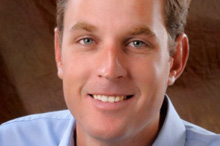 Ian Danley is being honored as a Champion of Change for his efforts as an Immigration Reformer.
Ian Danley is being honored as a Champion of Change for his efforts as an Immigration Reformer.
It is with sincere gratitude that I accept this Cesar Chavez Champions of Change Award. In Arizona especially, Cesar Chavez’s work and legacy give us great hope and encouragement as a sacred model for how we might work for justice in our world today. I am humbled and grateful to be recognized with this award.
It is always nice to be recognized for the work we do, work I find meaningful and central to my life. The truth is that so many have been working tirelessly for immigrant rights and for a fair and reasonable policy solution to our nation's broken immigration system. I am a part of a movement that is large, diverse, and beautiful. I am better for knowing these many servant leaders and am proud to work alongside them.
The first thing I ever did in the fight for immigration reform was in April 2004. I coaxed, prodded, and mobilized one hundred of my neighbors and fellow congregants to a leaders’ convocation that pushed local congressional leaders to support immigration reform and asked municipal leaders to avoid the use of local resources in efforts to enforce federal immigration law. I was excited to have so many people show up, and I was ready for my next organizing challenge. I have not stopped organizing since that action. I had no idea I would spend nearly ten years (God willing, this is our year) fighting for immigration reform. I had no idea Arizona was to become a bell-weather state for immigration issues. I have learned much since that Spring action in a Baptist sanctuary. I have much still left to learn.
The immigrant leaders I get to serve alongside – many of them are quite young – these are people I respect and love tremendously. Together we are building a justice movement in our city and country that I believe is a work of God; changing hearts, minds and, yes, systems in order to treat human beings as the divine inspirations of creation that they are. We hope and pray and work to ensure that our community will be known for its compassion towards everyone and that we will flee from any violation of humanity that destroys human potential and insults our Creator. We choose hope because there is no other option desirable and because the world is desperate for people full of hope.
Ian Danley serves on the advisory board at Promise Arizona.
Learn more aboutThe Defining Moments
Posted by on March 29, 2013 at 5:07 PM EDT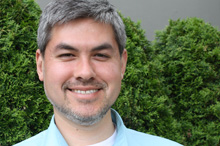 Rich Stolz is being honored as a Champion of Change for his efforts as an Immigration Reformer.
Rich Stolz is being honored as a Champion of Change for his efforts as an Immigration Reformer.
I cut my teeth in the immigrant rights movement nearly twenty years ago when I volunteered to help register voters and organize students against California’s anti-immigrant Prop 187. The defining moment for me was a trip down to Fresno when I and other students met with farm workers and attorneys fighting for the rights of immigrant workers and responding to raids being conducted by INS that were terrorizing families and intimidating activists.
This all happened at a time in my life when I was exploring my own identity as a Korean America – half Asian/half white – and understanding more deeply the history of the movement for equal justice and identity in the United States. I was profoundly influenced by the strategic brilliance and courage of Cesar Chavez, the debates over pan-Asian movement building in California, the example of liberation theology in the Catholic Church in which I was educated, and the powerful non-violent movement for civil rights and equal justice for African American liberation.
Today, as the Executive Director of OneAmerica, I continue to draw on this history for inspiration. OneAmerica was born in the fight to contain the backlash against religious, ethnic, immigrant, and refugee communities following the terrorist attacks of 9/11. I am proud and committed to our multi-ethnic organizational identity, and our focus on organizing immigrant and refugee communities across Washington State to build power in low-income communities of color to change the policies and institutions that impact the day to day lives of families and workers. I’m also proud of the amazing work we’ve done to make Washington State a more welcoming community, and to build the electoral strength of immigrant and refugee communities statewide.
Today, as we participate and lead in the campaign to enact just and humane immigration reform in Congress, I’m struck at how much the immigrant rights movement has grown in just the last decade. Our work in Washington State with the labor movement, the business community, the faith community, the civil rights community, and the vibrant community of immigrant groups, LGBT allies, women’s groups, and environmental groups reflect the growth of this movement nationwide.
Organizing is at the core of what we do. And the grassroots leaders of today – those being honored through the Champions of Change ceremony, and the countless volunteers, leaders and advocates on whom the honorees’ own work depends – are my continuing inspiration every day.
Rich Stolz is the Executive Director of OneAmerica
Learn more aboutGenerations of Struggle
Posted by on March 29, 2013 at 4:45 PM EDT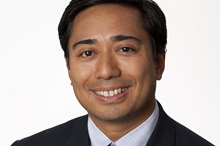 Lawrence Benito is being honored as a Champion of Change for his efforts as an Immigration Reformer.
Lawrence Benito is being honored as a Champion of Change for his efforts as an Immigration Reformer.
As community organizers, we know first-hand that democracy is not a spectator sport. Change can only happen with an engaged citizenry willing to take action. At the Illinois Coalition for Immigrant and Refugee Rights (ICIRR), our mission is to promote the full participation of immigrants in the political, social, cultural, and economic fabric of our diverse society. Over the last decade, we have marched, registered voters, and turned out people to vote for our candidate: comprehensive immigration reform.
When I see immigrants today, whether at naturalization ceremonies as they take the oath to become United States citizens, or aspiring citizens organizing for fairer immigration policies, I am reminded of my family’s story. When my grandfather arrived as a teenager in northern California to work in the fields, he was welcomed by signs on buildings that read “Positively No Filipinos Allowed” as well as anti-miscegenation laws stating that the races could not mix. When the depression hit, the jobs dried up and my grandfather went home, but he had dreams for his own children, who came to America several decades later.
As a second-generation Filipino-American, in many ways I am the product of an American dream. My parents came to America in the late 1960s for the same reasons as earlier generations of immigrants: in search of a better life for themselves and their family. Seeing their early struggles for acceptance and respect as immigrants to this country, and my own attempts to navigate the two worlds, was not always easy. I chose to become a community organizer because I saw my own family’s struggles reflected in the latest generation of immigrants to our country.
My commitment to immigration reform is born out of my family’s experiences, as well as witnessing the challenges and struggles of thousands of immigrant families in Illinois. The families that I have seen are hard-working, welcoming, and have a deep sense of faith and dignity. Their values and contributions to Illinois and to our nation are inspiring. These same families are tested with the ordeals and pains of family separation; mothers and fathers being taken from their children, or a sister who is made to wait twenty years to see her brother.
The fight for immigration reform has been a long battle. However, the demographic changes, along with the growing political recognition of Latino and immigrant voters this past election has led to a breakthrough this year, and hopes are high for immigration reform legislation to be passed in 2013. In Illinois, the Illinois Coalition for Immigrant and Refugee Rights (ICIRR) has led efforts to promote citizenship, immigration reform and immigrant integration, as well as voter registration, mobilization, and broader civic engagement. Through grassroots organizing efforts, public education, and electoral work, ICIRR has worked across party lines to advance policies and initiatives that welcome immigrants and recognize their contributions to all aspects of our society.
Nationally, ICIRR plays a leadership role within the Fair Immigration Reform Movement to advance just and humane immigration policies, and with the National Partnership for New Americans to promote citizenship, volunteerism, and immigrant integration.
I am honored and humbled to be one of the Cesar Chavez Champions of Change awardees because of the work of our many member institutions and the collective work of the many organizations working on immigration reform nationally. This recognition is the work of many fearless leaders who have refused to give up, and have continued to organize regardless of their immigration status, and to speak truth to power. Their passion and commitment is an inspiration to us all.
Lawrence Benito serves as the Chief Executive Officer at the Illinois Coalition for Immigrant and Refugee Rights (ICIRR).
Learn more about
- &lsaquo previous
- …
- 75
- 76
- 77
- 78
- 79
- 80
- 81
- 82
- 83
- …
- next &rsaquo

